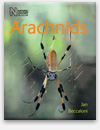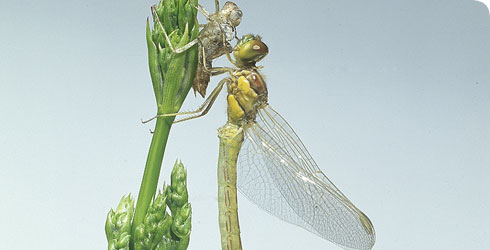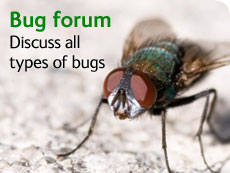Common insects and spiders
Plenty of bugs can be found without leaving the home or garden, from house spiders weaving away in the corner of your loft to May bugs crashing into your living room windows. Find out about the life cycle and behaviour of some you might encounter, along with tips on identification. Is that false widow spider really as black as you thought it was? And what are the most abundant insects in the world? Find out here.
-

Cockchafer or May bug (video)
Watch the cockchafer beetle on film and discover its key characteristics. Also known as the May bug, this relatively large beetle is normally seen flying between May and July.
-

Large willow aphid
Read about one of the largest aphid species in Britain. Why have no males ever been recorded?
-

The Biology of the Collembola (Springtails)
An introduction to the most abundant insects in the world.
-

Dragonflies, mayflies and stoneflies
Steve Brooks introduces us to a primitive group of insects that share an aquatic lifestyle and acrobatic flying skills.
-

Hemiptera...it's a bug's life
Explore the world of bugs, and their extremely diverse range of sizes, shapes and colours, with Jon Martin and Mick Webb.
-

Horseflies, robberflies and blowflies
Pests, predators and parasites – find out about this hugely diverse, widespread and successful collection of insects.
-

Hornet sightings create a buzz - 03/05/2007 (video)
Stuart Hine, manager of the Museum's Insect Identification Service, talks about the large number of hornet sightings he has had from the public.
-

Studying cockroaches - 30/07/2007 (video)
Watch George Beccaloni talk about cockroaches and his work on the first online database of the world's cockroaches, the Blattodea Species File Online (BSF) in this short video.
-

The world of spiders - 03/01/2003 (video)
Whether you loathe them or love them, explore the fascinating world of spiders with Museum scientist Paul Hillyard.
-

Bee-fly
This nectar-loving fly frequents country gardens and deciduous woodland where it is often mistaken for its look-alike, the bee.
-

False widow spider
This native species is usually found in or near man-made structures such as buildings, sheds and fences.
-

Common garden spider
This spider's orb-web is a wonderful feat of engineeering, best seen on dewy mornings.
-

House spider
These long-legged spiders pop up all over the house, especially at the end of summer.
-

Cockchafer or may-bug
The cockchafer or May-bug is found all over the British Isles in gardens, woods and fields but it is more abundant in the south.
-

Mealworm beetle
The mealworm is the larval stage, grub, of the beetle Tenebrio molitor.
-

Tube web spider
One of the largest in the UK, this spider is common in the south of England and uses 'fishing lines' to capture its prey.
-

False widow spider - 22/05/2007 (video)
Stuart Hine, Manager of the Identification and Advisory Service at the Museum, talks about the false widow spider.
Toolbox
Buy insect and arachnid books online

Visit the online shop to find all our authoritative guides on this fascinating animal group.
You can also buy other books, DVDs and lots of gifts inspired by the natural world.

